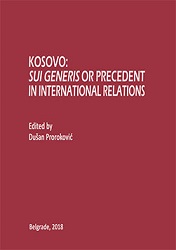THE END OF DEMOGRAPHIC TRANSITION IN KOSOVO: DOES THE MEANING OF THE POPULATION FACTOR CHANGE?
THE END OF DEMOGRAPHIC TRANSITION IN KOSOVO: DOES THE MEANING OF THE POPULATION FACTOR CHANGE?
Author(s): Vladimir Nikitović
Subject(s): Law, Constitution, Jurisprudence, International Law, Civil Society, Governance, Public Administration, Demography and human biology
Published by: Институт за међународну политику и привреду
Keywords: fertility transition; migration cycle concept; population projection; Kosovo; demographic change
Summary/Abstract: Political issues in Kosovo were strongly related to its population dynamics during the twentieth century, above all due to the “demographic explosion” induced by the huge lag in fertility transition if compared to the rest of Europe. However, soon after the turn of the century, the total fertility rate in Kosovo has dropped to about the replacement level (2.1 children per woman), which, along with permanent migration outflows since the 1990s, indicates a new demographic era in sight. Using the recent evidence on demographic and migration trends supported by the updated theoretical considerations in the framework of demographic transition and the migration cycle concept, we examine the key demographic implications that could be expected in light of assumed population dynamics in Kosovo over the next decades. The effects of the demographic momentum (population increase purely on account of the young age structure) reduced by the negative impact of emigration could expire up to 2035-40. As a result, the decreasing and ageing population could become a highly probable future of Kosovo in just 20-25 years, indicating the tremendous reversal could happen in the perception of the population factor in this territory from the viewpoint of political and security issues in the region.
Book: KOSOVO : sui generis or precedent in international relations
- Page Range: 299-320
- Page Count: 22
- Publication Year: 2018
- Language: English
- Content File-PDF

